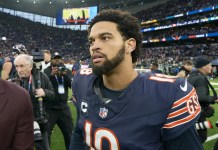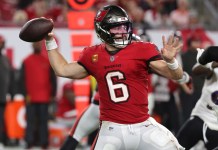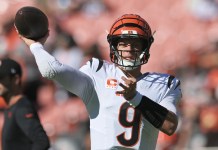There is an old saying about Washington politics: When one blackbird leaves the vine, the others will follow. American politics and the NFL take similar paths at times — in this case, once one player receives a huge contract, others want to follow his lead.
When the Cleveland Browns guaranteed every dollar in the mega-contract they gave Deshaun Watson, the rest of the league will soon want to follow. The Watson contract was a breakthrough for agents; it became their Independence Day, their Tea Party, their victory at Gettysburg. For more than 50 years, agents have fought for players to receive fully guaranteed money, and all they heard when demanding a fully guaranteed deal was a loud “no.” NFL teams hide behind the league’s funding laws enacted during the early 1960s, which protected players so teams didn’t default on their promises, yet it served as a huge benefit for the owners. It was kryptonite for any agent seeking fully guaranteed money. No owner wanted to change the rule, regardless of the income streams. Instead, it served as a blockade for fully guaranteed deals and prevented the NFL from looking like MLB and the NBA.
***Top NFL Resources***
*Join thousands of other sports bettors and unlock access to picks, public betting spits data, & the VSiN live video broadcast by upgrading to VSiN Pro. Grab your first month for less than $10.*
- NFL Expert Picks
- NFL Betting Hub
- NFL 2024 Week-By-Week Schedule
- Parlay Calculator
- NFL Betting Splits
- NFL Betting Odds
In practical terms here is how the funding law works as it relates to Watson. Watson signed a five-year deal at $230 million. He received $44.9 million as a signing bonus, and his salary for 2023-2026 will be $46 million each year, with every nickel fully guaranteed for skill and injury. Therefore, the Browns had to write a check to Watson, depending on the payout for $44.9 million upon signing and then send a check to the NFL offices next March for $138 million, to ensure the 2024-2026 seasons are paid. Normally NFL teams don’t have that much cash laying around, as they rely on the television money which begins each August to handle their payrolls and free agent commitments.
As wealthy as the owners have become, sailing on their huge yachts, cash flows matters as it does to any business. No owner wants to reach into his bank account to send a huge check to the NFL office, when that money could be used to increase his wealth in a hedge fund. Owners didn’t become rich doing bad deals. This Watson-to-the-Browns deal opened Pandora’s Box and now every agent will ignore the funding law rhetoric and demand their guarantee. Just imagine what will be said behind the next closed-door NFL owners-only meeting to Dee and Jimmy Haslam — it won’t be kind or pleasant and I am sure no one will congratulate them on the big trade. For all the moves this offseason, the contract of Watson, not the trade, is the most significant.
Indianapolis Colts general manager Chris Ballard took the job in 2017 and thought he was going to build a team around talented quarterback Andrew Luck. Luck was coming off a shoulder surgery that offseason and Ballard fully expected him to healthy and ready to play at the end of June. June turned into July, which turned into seeing Luck in 2018. With a 29-year-old quarterback finally healthy, the Colts went 10-6 before losing in the divisional round to the Kansas City Chiefs. Unfortunately for Ballard, Jan. 12, 2019, was the last time anyone saw Luck play quarterback, and since that Saturday, Ballard has been in search of his replacement.
His head coach Frank Reich coached and loved Phillip Rivers, while in San Diego together, so Ballard signed an aging Rivers, knowing it was going to be a short-term solution. Then because of the relationship between Reich and Wentz, from their Super Bowl-winning Philadelphia days, Ballard made a trade to secure Carson Wentz, the former second overall pick in the draft and a player that could offer long-term promise. That long-term promise turned into a short-term disaster as Wentz became self-destructive, careless with the football and attempted to make every left-handed throw a right-handed passer could make. Eventually, no one in the Colts building could defend him, not even his biggest champion Reich. Ballard then admitted his mistake of trading a first rounder for Wentz, and the search for another quarterback once again began.
In 2022 the quarterback search is challenging because this draft class — in spite of the mock drafts telling us that three or four will be first rounders — isn’t great. In fact, I would be shocked if one went in the first round. There are no quarterbacks that anyone can proclaim is a surefire starter in the league in 2023 in this draft. Matt Corral of Ole Miss has the skill set, yet he is on the smaller side and will take a year to get his body up to speed. The others will make teams, will demonstrate potential to start, yet offer no guarantee of becoming the main man a general manager and coach and sink their future into. Everyone went nuts the other day when Malik Willis made a great deep throw on the move during his workout day. Twitter exploded, everyone went all “Dickie Vitale,” extolling the talents of Willis from this workout. Relax, Francis, it’s a workout. It’s not real or relates to playing quarterback in the NFL. It’s a promotional event, a sales convention that the agents use to help create a social media campaign. Admittedly, at times it does work. It won’t work for Ballard, or any other good evaluator in need of a quarterback.
So, Ballard took the trade capital acquired from Washington for Wentz and turned it into ex-Atlanta Falcons quarterback Matt Ryan. Another short-term fix, but this one comes with more hope and promise. Ryan is older and towards the end of his career yet still demonstrates the capacity to make all the throws, play with great intelligence at the line of scrimmage and demonstrate leadership. Ryan doesn’t have to be great; he has to be effective. He doesn’t have to play above the rim, he needs to facilitate the offense, be precise on third down and allow running back Jonathan Taylor be the focus. More importantly, Ryan has to execute well in situational football, something Wentz never did. The Colts last year were 20th in red zone production on offense, and to make matters worse, their defense ranked 25th. If Indianapolis improves in both areas — offensively as a result of better decisions made by Ryan and defensively with new coordinator Gus Bradley taking over for Matt Eberflus — that alone will make them a much better team.
Besides fixing their mistake-prone quarterback position, the Colts need to upgrade their defense, in terms of scheme and players. Eberflus garnered tremendous publicity for his defensive acumen, yet when peeling back the layers, away from the media perception, Indianapolis’ defense was below average. They could create turnovers, which is tremendous, but they struggled to get off the field on third down (19th overall), were outscored by 40 points in the fourth quarter. Wonder why they lost so many close games? They allowed 32 touchdown passes, 7 yards on passing attempts and a 65% completion percentage. When the opponent needed to convert on fourth down against this highly praised defense, they were successful 62.1% of the time. Does that appear dominating to you? Of course not. But the turnovers camouflaged the problems and now Bradley needs to make the right adjustments.
If you’re thinking about betting over the Colts’ win total, pay close attention to their changes in terms of personnel on defense before making that decision. Everyone talks quarterback in Indy, and that will matter, but their improvement on defense is what matters most.
Speaking of win totals, can they set the total low enough for the Falcons? When general manager Terry Fontenot and Arthur Smith arrived in Atlanta, they made the classic mistake many (including myself) make — not immediately addressing the quarterback position. Ryan wasn’t the problem in Atlanta when they arrived. Both men inherited a good quarterback surrounded by a bad team on almost every level. Their talent on both lines was subpar and when they decided to keep Ryan, further investing into his cap number, they dug a $40.5 million hole, which severely impacts the salary cap today.
To further compound the problem, in 2021, they drafted Kyle Pitts with the No. 4 pick, who isn’t a tight end. Pitts can’t block anyone at the point of attack and is a non-factor in the run game unless he is blocking the edge support. Pitts is a wonderful supporting cast player, but not a foundational piece. Opposing teams went to their nickel defense the moment Pitts entered the game, never worrying any direct runs in his direction. The defenses had to match his size and speed in the passing game, but the point of being a dominating tight end requires excelling at two things, and Pitts was only good at one. Every defense treated Pitts as a big receiver, and the Falcons lost their match-up advantage.
Since Atlanta wasted a year, and finally faced the reality its talent was bad, the Falcons now finally are going to rebuild. And for Atlanta fans, this won’t be pretty. For all of us waiting to bet the win total for the Falcons, anything over 5.5 is a clear under bet.




